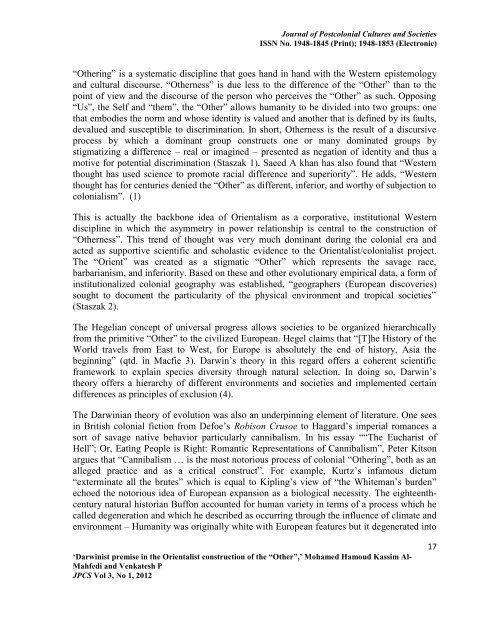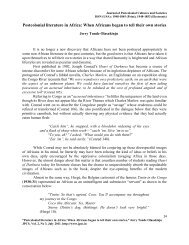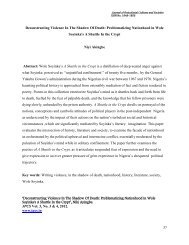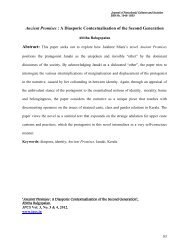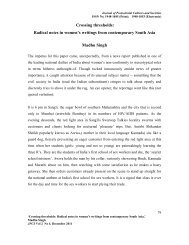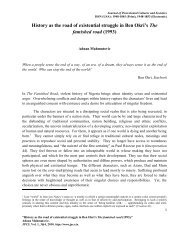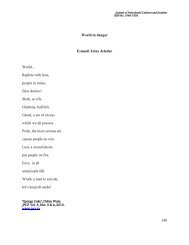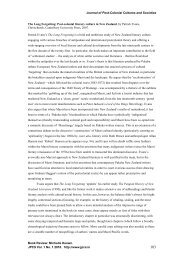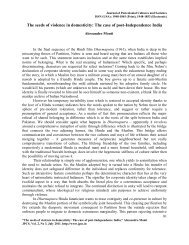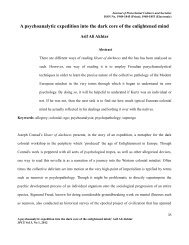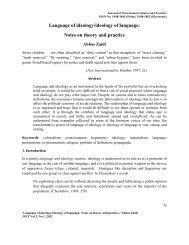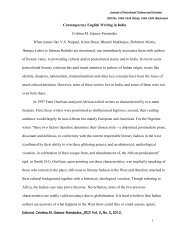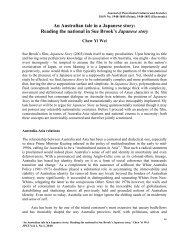Darwinist premise in the Orientalist construction of the âOtherâ - JPCS
Darwinist premise in the Orientalist construction of the âOtherâ - JPCS
Darwinist premise in the Orientalist construction of the âOtherâ - JPCS
You also want an ePaper? Increase the reach of your titles
YUMPU automatically turns print PDFs into web optimized ePapers that Google loves.
Journal <strong>of</strong> Postcolonial Cultures and Societies<br />
ISSN No. 1948-1845 (Pr<strong>in</strong>t); 1948-1853 (Electronic)<br />
“O<strong>the</strong>r<strong>in</strong>g” is a systematic discipl<strong>in</strong>e that goes hand <strong>in</strong> hand with <strong>the</strong> Western epistemology<br />
and cultural discourse. “O<strong>the</strong>rness” is due less to <strong>the</strong> difference <strong>of</strong> <strong>the</strong> “O<strong>the</strong>r” than to <strong>the</strong><br />
po<strong>in</strong>t <strong>of</strong> view and <strong>the</strong> discourse <strong>of</strong> <strong>the</strong> person who perceives <strong>the</strong> “O<strong>the</strong>r” as such. Oppos<strong>in</strong>g<br />
“Us”, <strong>the</strong> Self and “<strong>the</strong>m”, <strong>the</strong> “O<strong>the</strong>r” allows humanity to be divided <strong>in</strong>to two groups: one<br />
that embodies <strong>the</strong> norm and whose identity is valued and ano<strong>the</strong>r that is def<strong>in</strong>ed by its faults,<br />
devalued and susceptible to discrim<strong>in</strong>ation. In short, O<strong>the</strong>rness is <strong>the</strong> result <strong>of</strong> a discursive<br />
process by which a dom<strong>in</strong>ant group constructs one or many dom<strong>in</strong>ated groups by<br />
stigmatiz<strong>in</strong>g a difference – real or imag<strong>in</strong>ed – presented as negation <strong>of</strong> identity and thus a<br />
motive for potential discrim<strong>in</strong>ation (Staszak 1). Saeed A khan has also found that “Western<br />
thought has used science to promote racial difference and superiority”. He adds, “Western<br />
thought has for centuries denied <strong>the</strong> “O<strong>the</strong>r” as different, <strong>in</strong>ferior, and worthy <strong>of</strong> subjection to<br />
colonialism”. (1)<br />
This is actually <strong>the</strong> backbone idea <strong>of</strong> Orientalism as a corporative, <strong>in</strong>stitutional Western<br />
discipl<strong>in</strong>e <strong>in</strong> which <strong>the</strong> asymmetry <strong>in</strong> power relationship is central to <strong>the</strong> <strong>construction</strong> <strong>of</strong><br />
“O<strong>the</strong>rness”. This trend <strong>of</strong> thought was very much dom<strong>in</strong>ant dur<strong>in</strong>g <strong>the</strong> colonial era and<br />
acted as supportive scientific and scholastic evidence to <strong>the</strong> <strong>Orientalist</strong>/colonialist project.<br />
The “Orient” was created as a stigmatic “O<strong>the</strong>r” which represents <strong>the</strong> savage race,<br />
barbarianism, and <strong>in</strong>feriority. Based on <strong>the</strong>se and o<strong>the</strong>r evolutionary empirical data, a form <strong>of</strong><br />
<strong>in</strong>stitutionalized colonial geography was established, “geographers (European discoveries)<br />
sought to document <strong>the</strong> particularity <strong>of</strong> <strong>the</strong> physical environment and tropical societies”<br />
(Staszak 2).<br />
The Hegelian concept <strong>of</strong> universal progress allows societies to be organized hierarchically<br />
from <strong>the</strong> primitive “O<strong>the</strong>r” to <strong>the</strong> civilized European. Hegel claims that “[T]he History <strong>of</strong> <strong>the</strong><br />
World travels from East to West, for Europe is absolutely <strong>the</strong> end <strong>of</strong> history, Asia <strong>the</strong><br />
beg<strong>in</strong>n<strong>in</strong>g” (qtd. <strong>in</strong> Macfie 3). Darw<strong>in</strong>’s <strong>the</strong>ory <strong>in</strong> this regard <strong>of</strong>fers a coherent scientific<br />
framework to expla<strong>in</strong> species diversity through natural selection. In do<strong>in</strong>g so, Darw<strong>in</strong>’s<br />
<strong>the</strong>ory <strong>of</strong>fers a hierarchy <strong>of</strong> different environments and societies and implemented certa<strong>in</strong><br />
differences as pr<strong>in</strong>ciples <strong>of</strong> exclusion (4).<br />
The Darw<strong>in</strong>ian <strong>the</strong>ory <strong>of</strong> evolution was also an underp<strong>in</strong>n<strong>in</strong>g element <strong>of</strong> literature. One sees<br />
<strong>in</strong> British colonial fiction from Defoe’s Robison Crusoe to Haggard’s imperial romances a<br />
sort <strong>of</strong> savage native behavior particularly cannibalism. In his essay ““The Eucharist <strong>of</strong><br />
Hell”; Or, Eat<strong>in</strong>g People is Right: Romantic Representations <strong>of</strong> Cannibalism”, Peter Kitson<br />
argues that “Cannibalism … is <strong>the</strong> most notorious process <strong>of</strong> colonial “O<strong>the</strong>r<strong>in</strong>g”, both as an<br />
alleged practice and as a critical construct”. For example, Kurtz’s <strong>in</strong>famous dictum<br />
“exterm<strong>in</strong>ate all <strong>the</strong> brutes” which is equal to Kipl<strong>in</strong>g’s view <strong>of</strong> “<strong>the</strong> Whiteman’s burden”<br />
echoed <strong>the</strong> notorious idea <strong>of</strong> European expansion as a biological necessity. The eighteenthcentury<br />
natural historian Buffon accounted for human variety <strong>in</strong> terms <strong>of</strong> a process which he<br />
called degeneration and which he described as occurr<strong>in</strong>g through <strong>the</strong> <strong>in</strong>fluence <strong>of</strong> climate and<br />
environment – Humanity was orig<strong>in</strong>ally white with European features but it degenerated <strong>in</strong>to<br />
‘<strong>Darw<strong>in</strong>ist</strong> <strong>premise</strong> <strong>in</strong> <strong>the</strong> <strong>Orientalist</strong> <strong>construction</strong> <strong>of</strong> <strong>the</strong> “O<strong>the</strong>r”,’ Mohamed Hamoud Kassim Al-<br />
Mahfedi and Venkatesh P<br />
<strong>JPCS</strong> Vol 3, No 1, 2012<br />
17


